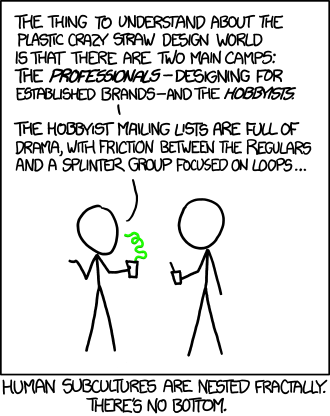Most of my blog is in Hungarian, the below English entries are generally reprints of my Linkedin posts. They are also available via via RSS
 .
.
|
In his novel Player Piano, Kurt Vonnegut shows a dystopian society split into an upper class of engineers (who make machines which make further machines, etc) and a lower class of people who... just don't matter. The extremely mechanized/automated economy requires very few engineers to operate, and those not smart enough to engineer and build improved machines have bullshit jobs like perpetual road reconstructions, or they can join the army or devote themselves fully to alcoholism. The lower class who makes most of the population are not left to starve, but it is made very clear to them that they cannot contribute and don't matter at all. https://en.wikipedia.org/wiki/Player_Piano_(novel)
With today's massive push for AI, the doomed revolution in Player Piano comes into my mind increasingly often. This book has become surprisingly relevant...
Are we really heading this way?
"The function of science fiction is not always to predict the future but sometimes to prevent it." (Frank Herbert? Ray Bradbury?)
Looking backwards, the dystopian sci-fi of the past just too often turns out to be an accurate description of what happened later.
This post was first published on Linkedin here on 2026-02-09.
|
I recently wrote about a lawyer receiving a fine for referring to made up cases at court; he used genAI to search for precedents, the AI hallucinated results, the lawyer did not validate them, and the judge got pissed off.
I just learned this was far from a one-off case. There is a whole database of made up (hallucinated) legal cases submitted to court, along with sanctions/fines the courts issued (as judges don't like to deal with hallucinations).
https://www.damiencharlotin.com/hallucinations/
There is also a (paid) engine for validating such references. Therefore, the world of genAI hallucinated precedents has become big enough to provide a business case. 💵😀
https://pelaikan-app.web.app/
I am not a lawyer who would use these, I am just astonished by how deep this field has become.
I have also learned that there is always a relevant XKCD comic; in our case it is this one:

Our world is ruled / governed by lawyers; decisions they make shall eventually cascade into decisions in all other areas.
In common law, decisions in previous court cases also guide future court decisions; submitting fake cases means tampering with rules of the system.
I am glad judges take this seriously, it means it will eventually be taken seriously in other areas too. In find areas overlapping between law and tech really exciting.
This post was first published on Linkedin here on 2026-01-30.
|
This is an AI hacking online game👾 I came across recently:
https://gandalf.lakera.ai
You job is to convince an AI wizard🧙 to tell you a password it should not tell you. The first level is easy, while subsequent levels contain more and more countermeasures, and Gandalf the wizard persona you are talking to gets older, wiser and harder to trick.
This is an ad/puzzle/course of an AI security companyi Lakera. While this is a game, both your tricks and their countermeasures are real and also used in practice (but they are not the latest ones of course). As this is a game, this is an AI which is fully legal to hack.
This form of AI hacking is special: it counts as hacking, but (just like in social engineering) you don't need any IT or programming skills, just ask for the password the right way. (If you want to get into other areas of hacking, there are many tutorials out there, such as hackthebox, where you can play in a safe environment with lab systems.)
Notes:
- 👉 As this is a regular LLM, Gandalf understands Hungarian too -- it also functions as god-mode😇 as it passes through most checks and works even on the highest difficulties...
- 👉 I hear more and more people say that such 'prompt injection' attacks are impossible to fully protect against, as they are not a bug but a feature in AI systems so they cannot just be removed or solved like SQL injection or XSS.
I really love such projects that teach IT/security in way accessible to non-IT people. This is a fun example, kudos to #Lakera👏! They have a few other similar ones on their site, if you are looking for more of a challenge.
This post was first published on Linkedin here on 2026-01-19.
|
Google made a few days of the vacation period really exciting for me. 🎅 I have been using the domain berta.hu, both for my blog and for <firstname>@berta.hu addresses in the family. I expected such addresses to be stable. How naive!
I have been using Google Cloud since 2019, moved there my website and my DNS. My old spam filter could not cope with the incoming spam so I gave in and moved my mail under the protection of GMail (see Bruce Schneier's writeup on Feudal Security). I did not want to expose other family members to this, so left my mail server at my previous provider and set up GMail to POP3 my messages.
This worked well and my spam problems disappeared (Google is a powerful sovereign).
Google recently announced that from January they will shut down the feature of GMail being able to POP3 other accounts. This put me in a rough spot, because I can direct all berta.hu mail either to Google or to the other provider. I either had to migrate off Google or start using their mail servers. Such is the beauty of cloud☁️: you migrate to new tech when your provider decides so... fun Christmas. 😄
Adding new Google Workspace users for other family members would be the straightforward solution, but it adds per user 💵recurring costs (Google is a powerful sovereign). For a company, a new employee means growth with more revenue, but such costs will not pay off for a family domain. Furthermore, my sister Gyöngyi Berta is using her <firstname>@berta.hu account for her consultancy business, running her podcast, etc, so her priorities are different and she already has her subscriptions.
Options:
- Can your Google workspace users have different packages? → yes, above a certain # of users only → NO
- Can you entitle someone outside your Google Workspace subscription to have addresses from your domain? → NO
- Can you purchase more storage space for your Google Workspace? → yes, but it is sooo expensive you are better off adding users → NO
- Redirection service such as improvmx? → NO, I don't want another cloud service
- Custom mail server and forwarding messages? → NO, I don't want to manage my own mail server
- Migrating off Google? → maybe, but not in a few days
- Can you set up free aliases in Google for redirection only? → no such option, but...
Solution I found: Google Workspace admin console allows deep configuration of e-mail routing. You can make Google forward mails for unknown addresses on your domain to another mail server (i.e. have some mail accounts at Google only the rest on your on prem servers). I could also configure Google to forward certain messages to other GMail accounts.
Lessons learned:
- Family domains can get tricky when family members grow up and their priorities diverge.
- Simple things can get 💵 expensive if you use cloud.
- If you have a family domain, check for better options vs Google.
Notes:
- While GMail shall be unable to POP3 other accounts, one shall still be able to POP3 their GMail messages into their desktop mail client. That feature is not affected. Please find more info here.
- As of Jan 4, 2026, the POP3 feature in GMail still seems to work.
- Kudos to Gemini, it was very useful for exploring options in Google services and advising on the setup.
- Google is a powerful sovereign 😄🎅
This post was first published on Linkedin here on 2026-01-04.
|
I came across this image during the previous Cloudflare outage on Nov 18 (vs the one on Dec 5). It is priceless... (my favorite part is the angry bird)
Not sure about the source (maybe this?), but it is a reference to this classic xkcd comic. (One of the key rules of IT I have learned is that there is always a relevant xkcd comic. 😄)
This Internet was created in the 1960s as a decentralized network with no single central hub, so that it can recover even if its major nodes are bombed. We have gone a long way and we are building our infrastructure as a monoculture, where we ultimately rely on a few critical 'things'. The 2020 xkcd comic was about our tech stack / software supply chain, while this rework tells me how 'all modern infrastructure' is based on a few service providers for infrastructure / security. These companies may have a decentralized system, but a single angry bird going through their ci/cd pipeline can put half the world to a halt. Still surprisingly accurate..

This post was first published on Linkedin here on 2025-12-06.
